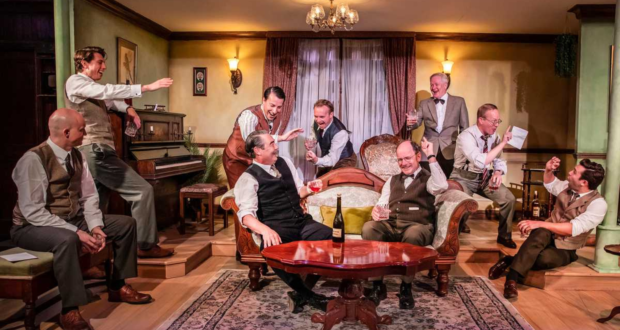Can science be separate from politics? Operation Epsilon puts this question to the audience and explores the ethical implications of being complaisant. Summary
Rating
Excellent
It’s safe to say that the Barbenheimer phenomenon dominated this past summer. Whilst we are yet to have a stage production of Barbie, we do have an insight into the other side of Oppenheimer with Operation Epsilon.
Written by Alan Brody and directed by Andy Sandberg, the production is set in 1945 and depicts the German scientists that were detained at Farm Hall, located near Cambridge. British and American intelligence wanted to decipher the German’s advances in nuclear fission in order to establish how close they were to creating their own atomic bomb. They therefore bugged the rooms of Farm Hall to learn more. This play is based on transcripts from that time.
The set design is elaborate and sophisticated, extending across a wide stage and fitting the space well. There is enough room for sofas, bookcases, a drinks cart and a piano, as well as a cast of eleven. Janie E Howland has done a fantastic job: everything on stage is reminiscent of the 1940s and the audience are successfully transported back in time. For instance, when the group of scientists read about the atomic bomb in Hiroshima, the newspapers they clutch showcase a fantastic attention to detail, further immersing the audience in the historical setting.
The set has a second level which is utilised well throughout the show, with characters performing more intimate monologues and duologues in the space. This mezzanine is separated into two bedrooms, with a landing in the middle. One bedroom is used to give focus when Werner Heisenberg (Gyuri Sarossy) obsessively goes over his incorrect uranium calculations.
Having eleven characters on stage at once is quite daunting and at times it’s difficult to remember who’s who. However, Major Tom Rittner, an English officer played by Simon Bubb, helpfully introduces us to the men one by one. To the left of the stage, Rittner is in his private office. In the middle section, an argument amongst the German scientists unfolds which periodically halts, like a series of snapshots. Each time the dialogue freezes, a spotlight lands on the individual who has just spoken, momentarily highlighting them in the glow. Rittner then offers a brief insight into their identity and background. This is a very effective way of introducing the characters, whilst also keeping the pace of the show quick and focused.
Arguments are a recurring element throughout this play, which can be tiresome, even if accurate. Brought on by cabin fever, the scientists are constantly disagreeing with one another on abhorrent topics. Their central debate is about who actually worked for Hitler and who was a member of the Nazi party, with some being more open to criticism than others. Yet it is Max Von Laue (Simon Chandler) who speaks the most sense, reminding them all that fundamentally they worked under a regime that committed atrocities.
One standout scene is between Rittner and Otto Hahn (Nathaniel Parker), where the latter learns about the devastation of Hiroshima. Hahn blames himself for the weapon, as he contributed to discovering nuclear power in 1938. However, he is more than happy to accept a Nobel Prize for this discovery, a few scenes later.
The all-male cast are exceptionally talented, but some characters feel rather underused. However, the actors all exhibit great chemistry with each other and collaborate seamlessly on stage. They create an appropriate tension for the difficult topic of the ethics of personal complaisance discussed.
Written by Alan Brody
Directed by: Andy Sandberg
Set Design by: Janie E Howland
Lighting Design by: Clancy Flynn
Operation Epsilon plays at Southwark Playhouse Elephant until 21 October. Further information and bookings can be found here.
 Everything Theatre Reviews, interviews and news for theatre lovers, London and beyond
Everything Theatre Reviews, interviews and news for theatre lovers, London and beyond



